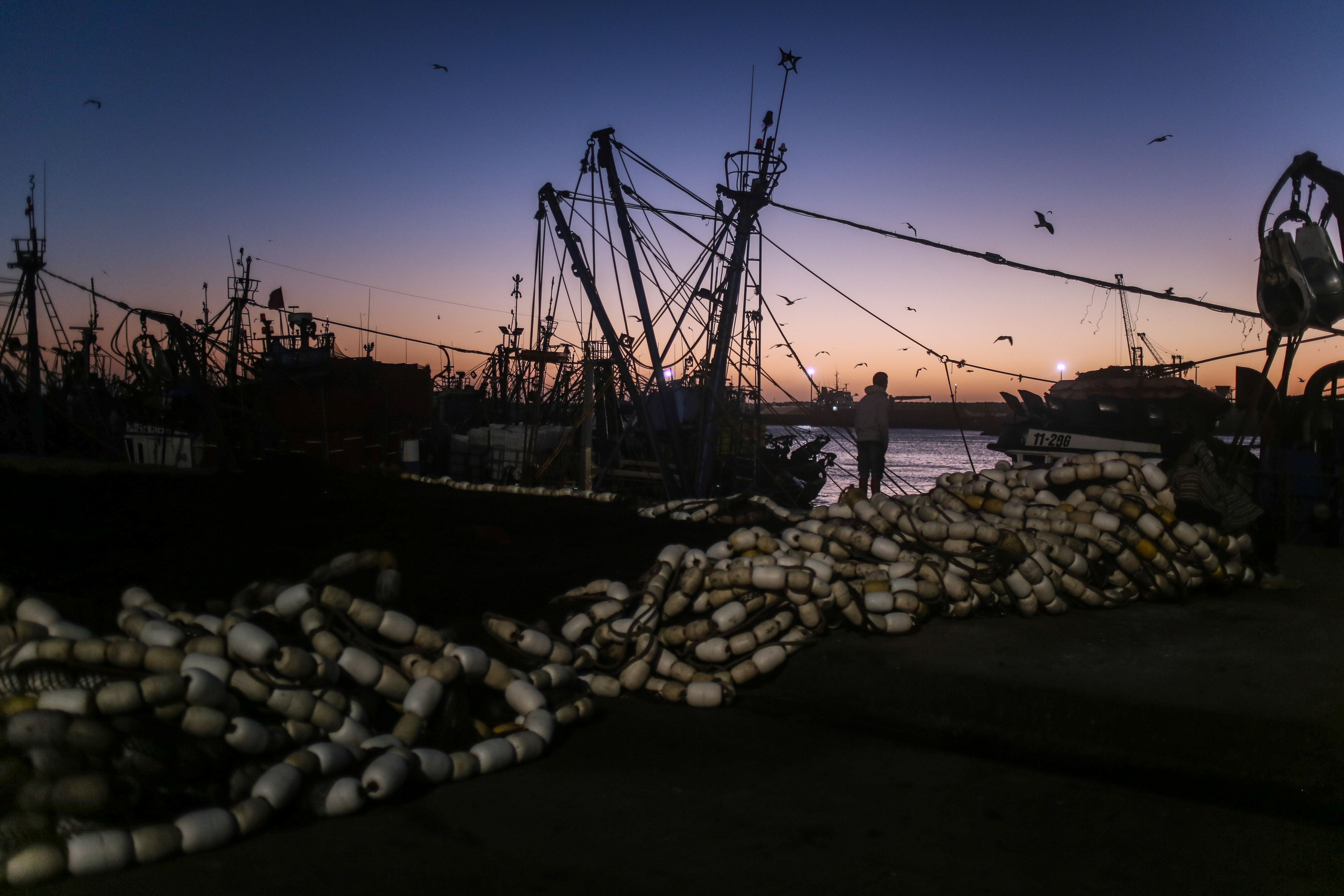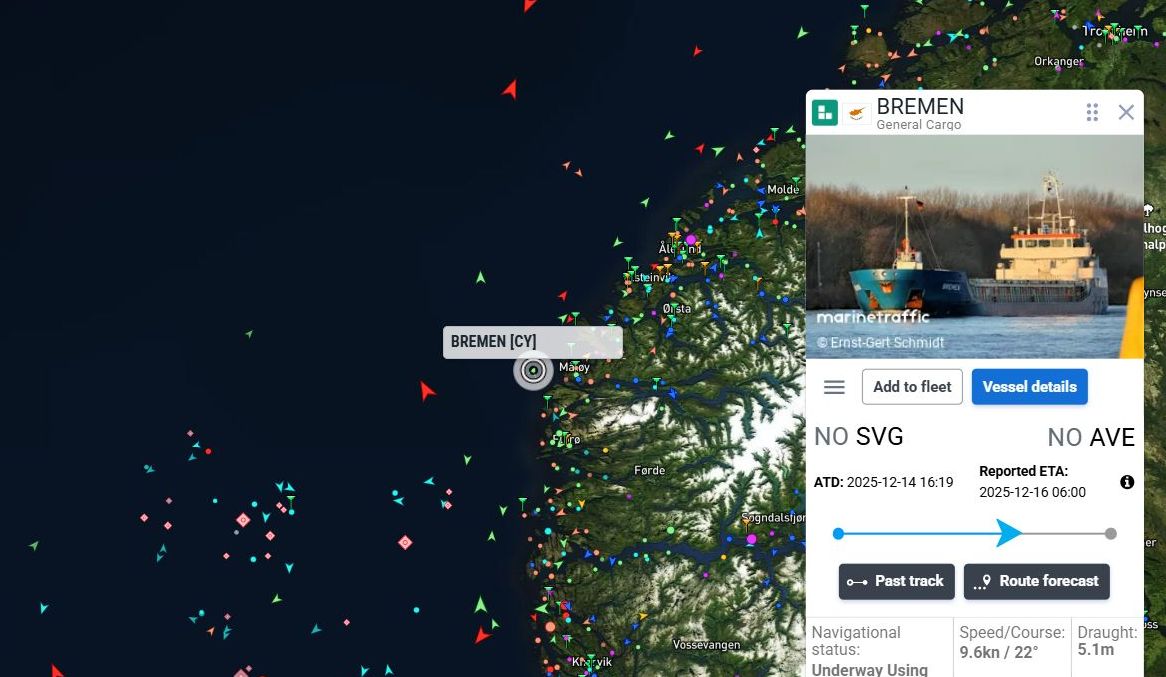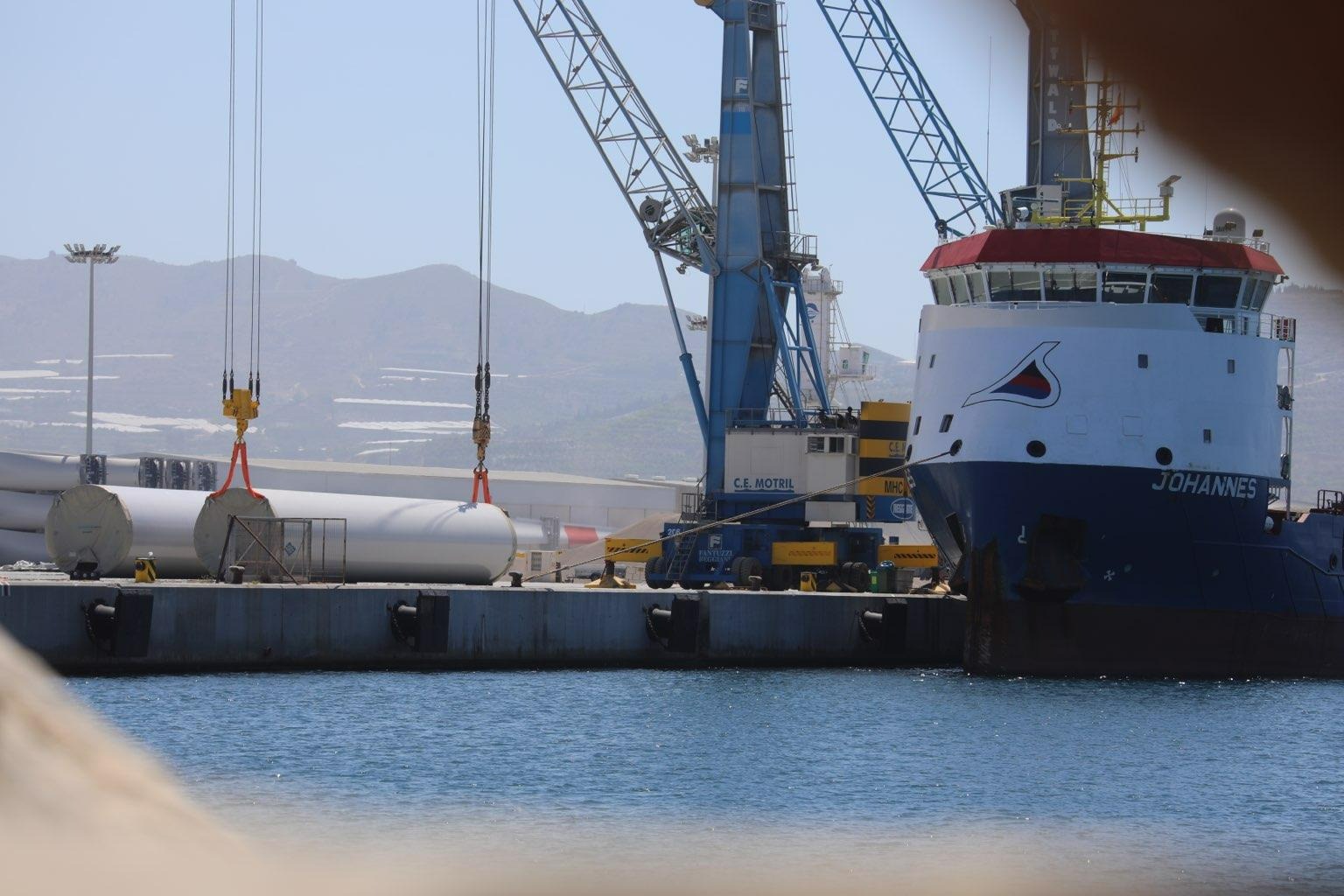Senia snakket for FN
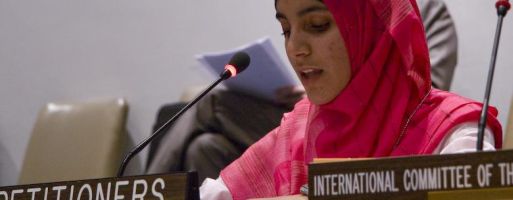
Den saharawiske studenten Senia Abderahman snakket for FNs avkoloniseringskomite denne uken. Senia studerte tidligere i Norge.
Publisert 11. oktober 2009
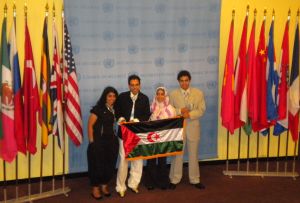 For noen år siden studerte Senia Abderahman ved United World Colleges i Fjaler i Sogn og Fjordane. De siste årene har hun studert i Massachussets, USA.
For noen år siden studerte Senia Abderahman ved United World Colleges i Fjaler i Sogn og Fjordane. De siste årene har hun studert i Massachussets, USA. Også Agaila Abba Hemeida, Alouat Hamoudi Abdelfatah og Salek Maoloud Lebaihi ga taler for FN-komiteen. Alle ba om at deres rett til selvbestemmelse respekteres.
Les appellene deres under.
Petition to United Nations Special Political and Decolonization Committee
The Question of Western Sahara
By Senia Bachir Abderahman
Hearings of October 6-7, 2009
Mr. Chairman, Distinguished Delegates, Ladies and Gentlemen,
I am humbled and honored to speak before you today as the voice representing those whose voices cannot be heard in the world: the Saharawi people. My name is Senia Bachir Abderahman. I am a native of Western Sahara, a country that I can only dream to see someday. Currently, I am in my last year at Mount Holyoke College; a womens institution in Western Massachusetts that brings young and determined women from around the globe to share ideas and teach each other to make a difference in our world today.
Mr. Chairman and Members of the Committee
This is the third year I speak before the UN Special Political and Decolonization Committee, and it is unfortunate to say that little, if nothing, has been done regarding Africas last colony. Since the invasion of my country took place in 1975, the Moroccan authorities have knowingly violated international law, the resolutions of the United Nations and the Geneva Conventions. First, they refused the Saharawi people their right to self-determination, and then they imported several thousand Moroccan settlers into the territories of Western Sahara, which forced numerous Saharawis, including my family and friends to seek refuge in Algeria. Over three decades later, we remain there, more than 200,000 of us. Today, the Moroccan government goes even beyond that by violating human rights, exploiting our natural resources, and spreading deliberate lies through the media.
Mr. Chairman and Members of the Committee
As a young student, I am very fortunate to have this opportunity to express my concerns before you today. My fellow Saharawi students still living in the occupied territories of Western Sahara are not so lucky. Since May 2005, many Saharawi youths in the occupied territories of Western Sahara and students at universities in Morocco have taken on a nonviolent resistance for a basic human right; their right to self-determination. It is important to remember that this right has been recognized through various United Nations Security Council and General Assembly resolutions, as well as in the agreements signed between the kingdom of Morocco and the POLISARIO Front. Yet, according to many Saharawis, numerous international bodies including Amnesty International and Human Rights Watch, and witnesses, dozens of Saharawis continue to be brutally attacked, detained aExcellentnd arrested, while many more are getting injured and even killed by the Moroccan police and armed forces. In addition, it has been reported that the attacks involve severe beatings and sexual abuse, as well as harassment of hospitalized victims.
Mr. Chairman and Members of the Committee
The latest case occurred on August 2009 in Agadir airport, Morocco, where a group of six Saharawi and seven Moroccan students were banned from traveling to Oxford, UK to attend a program named TalkTogether. This program aims to foster greater trust and mutual understanding between the Saharawi and Moroccan youths by enabling them to explore possible solutions to the conflict. To protest against the injustice, the Saharawi students staged an open hunger-strike. However, after 23 hours, the airport authorities responded by calling the Moroccan police, who stormed in, beat students rigorously and drove them away in vehicles. Days after the incident, one of the female students, Nguia El Haouassi it is sad her name does not ring a bell to many of you sitting here today was kidnapped, beaten, sexually harassed and left naked in the outskirts of her city, Al-Aiun. It is absolutely unacceptable in todays world, where we have organizations like you, the United Nations, that any individual be it young or old should face any kind of torture.
Mr. Chairman and Members of the Committee
As I speak now, many Saharawi prisoners are being harassed and tortured in Moroccan prisons, many students are discriminated against in universities and many are simply disappearing. I ask you why; as these deliberate violations continue to take place, does the International Community turn a blind-eye to the Western Sahara issue? Why does the Moroccan governments ignorance of the Universal Declaration of Human Rights (articles two, three, five, seven, nine, etc.) go unnoticed? Why is our primary right to be born, free and equal in dignity rights as stated in Article 1, breached?
On behalf of the Saharawi youth, I urge the UN and the rest of the world to consider these questions, and take immediate action to prevent the ongoing human rights violations in the occupied territories of Western Sahara. As the president of the United States, Barack Obama said: change will not come if we wait for some other person or some other time. We are the ones we've been waiting for. We are the change that we seek, I invite all of you to be THAT change.
Thank you!
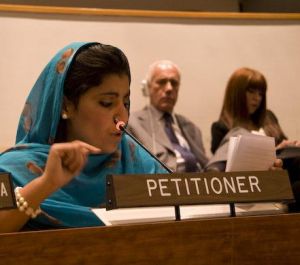 United Nations Hearing on the Western Sahara
United Nations Hearing on the Western SaharaSpecial Political and Decolonization IV Committee
October 6-7, 2009
By Agaila Abba Hemeida
Honorable Mr. Chairman and the Members of the Committee it is an honor to speak before you today as an advocate for the Saharawi people.
Security Council Resolution 1756 states that the solution to the question of Western Sahara is the satisfaction of self-determination of people of its territory, Three decades later, the Saharawi people still await a chance to have an opportunity to exercise their right to self-determination. Meanwhile, the Kingdom of Morocco continues its illegal occupation of Western Sahara. Not only has Morocco continued with its occupation, it is in violation of all the agreements and the principles of human rights through the illegal exploitation of our natural resources, beating and raping our people and women, and they also aim to destroy our identity as an indigenous people and as a nation by forcing the weight of their identity upon us.
Mr. Chairman and Members of the Committee
While Morocco enjoys the luxury of its occupation, our cause is neglected by the rest of the International Community. It is an occupation that has taken our land and left us homeless. Half of the Saharawi live in the Occupied Territory, where they are experiencing all kinds of aggressions, while the other half lives in one of the biggest refugee camps in the world. This camp is located in southwestern Algeria, this is where I myself was born and my family presently lives under the hardship of one of the most inhabitable deserts in the world, where the temperature can reach 130 degrees Fahrenheit and where we are dependent daily upon humanitarian aid.
Along with my family there are approximately 200,000 people, half of which are children. Four of these children are my sisters: Aziza who is 10, Fatma who is 9, Monina who is 7 and Muema who is 5 years old. They all lost their father due to one of the many sicknesses that currently exists in the refugee camps. It is heartbreaking seeing my sisters growing up without either a male role model or a father. I, myself have gone through the same situation losing my father at a young age due to the war in 1975 between Western Sahara and Morocco. Not only are my sisters suffering the loss of their father, but also the lack of nutrition and access to quality health care or decent schools or even something as simple as a toy that they can play with instead of cans to entertain themselves.
Mr. Chairman and Members of the Committee
My sisters and the rest of the Saharawi children are considered the future generation who will bring about change for Western Sahara. But, how can they dream of being such a generation when there is an occupation that has crushed their hopes and dreams of being doctors to heal the sick, teachers to educate the future generations, diplomats to implement diplomacy that would bring peace, activists to advocate for justice for the oppressed? As a person who was born and spent most of her childhood in the refugee camps, I was in the same position as my sisters and the rest of the children, while my dream was to someday be an ambassador that I might take a role in a peaceful resolution to my peoples situation. Thanks to the generosity of my American host family, now I have the chance to pursue higher education and someday become what I dreamed of being as a child. It is my dream that not only my sisters will have the same opportunities as me, but also for every Saharawi child to have the chance to receive an excellent education and to fulfill their dreams.
Mr. Chairman and Members of the Committee
It is deeply distressing to see the dreams of each precious child left unfulfilled due to the illegal Moroccan occupation of their county. It is written in every Saharawi heart to have the opportunity for basic human rights; their right to self-determination where they can vote in a free and fair referendum, to have the chance for Self-determination and the celebration of their freedom. Still, decades later they are waiting under the unbearable heat of the desert for that chance and for that vote.
Mr. Chairman and Members of the Committee
How long will the illegal Moroccan occupation continue to crush our childrens dreams of freedom? When will justice speak on behalf of their suffering? Even the answers for these questions are uncertain but we, the Saharawi, have not lost hope in the power of diplomacy that one day Western Sahara and the Kingdom of Morocco will find a solution through mutual negotiation to the end of this dispute, and Saharawi people and children to exercise their dream of living in freedom, dignity and peace in the land that is within their hearts.
Long Live Western Sahara and freedom to all oppressed peoples around the world!
Thank you very much for your attention!
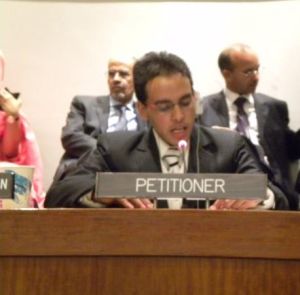 United Nations Hearing on the Western Sahara
United Nations Hearing on the Western SaharaSpecial Political and Decolonization IV Committee
October 6-7, 2009
By Alouat Hamoudi Abdelfatah
Mr. Chairman, Respected Delegates, Ladies and Gentlemen
Good afternoon!
First of all, I would like to thank you for giving me this great opportunity to be the voice of the voiceless and reminder of the most forgotten people in the world: the Saharawi people.
My name is Alouat Hamoudi, I am a refugee from Western Sahara, a country that I have never seen, but I see it every day in the eyes of my family members and in the eyes of the more than 200,000 Saharawi refugees in Algeria. Currently, I am a student at Westminster College: a liberal art institution in Fulton Missouri.
Mr. Chairman and Distinguished Delegates
Today, I return to speak to all of you about an issue that is one of the central topics of this committee, and that is the issue of Western Sahara.
It has been a year since I last spoke before this same committee, and it is unfortunate to say that nothing has been done in order to solve this salient and most neglected international dispute.
As you already know the Western Sahara is one of the few areas of the world that is officially recognized by the United Nations as a Non-self Governing Territory. There is no country in the world recognizes Moroccos sovereignty over the territory including Moroccos closest allies.
The General Assembly of the United Nations and the International Court of Justice also affirmed the Saharawi peoples inalienable right to self determination in the years 1965-1975.
Despite all this, nothing happened during these years. The only thing we have seen is that not only has Morocco rejected all the UN resolutions; but Morocco has never been punished by the International Community for its countless violations of international law. Keep in mind that Morocco is a member of the United Nations!
In the meantime, the suffering of the Saharawi people continues. More than 200 thousands refugees still live in Algerian desert including my own family in heartbreaking conditions. There is not enough food, no medicine, no clean water and no sufficient hospitals. Their daily life depends on international humanitarian aid.
In the occupied Western Sahara, the human rights violations committed by the Moroccan force police are getting worse and worse every day. According to Human Rights Watch, Amnesty International a dozen of my students colleagues have been kidnapped and arrested, while many political prisoners have been unjustly trialed.
It is painful, it is wrong to see my people suffer everyday, while the rest of the world goes about in apathy and shameful silence. It is a tragedy to allow colonization in an age characterized by respect for human rights, democracy, justice and social liberty for all.
Now these are facts. I do not thin that any of you could dispute them, but the question is when are the Saharawi people going to get their justice and freedom?
Mr. Chairman and Respected Delegates
Some will argue that this conflict is out-of-date and that the era of decolonization is over. Well, I ask why East Timor and not the Western Sahara? Why Monte Negro and not Western Sahara? Why Kosovo and not the Western Sahara? Isnt Western Sahara already a country and a founding member of the African Union? And why does the world still have a committee called Special Political and Decolonization Committee?
Some will say that self-determination is unrealistic. However, isnt self-determination the essence of democracy that we all love and value? Isnt democracy the ultimate choice by the people? Then why are not the Saharawi people allowed to decide their own political status?
There are those who simply do not care, but the Saharawi people do care. They may not find their hope in the United Nations but they will never despair. They will continue to fight for their right to self-determination despite all the odds.
Mr. Chairman, Respected Delegates, Ladies and Gentlemen
Those who champion the ideals of liberty, equality and fraternity, today I say Western Sahara is your challenge. And those who depend on the power of others, I say there is nothing that can overcome the commitment of common people to achieve their freedom.
In conclusion, let me remind you that I lived through and am still surviving this conflict. It is my sincere conviction that the international community and all concerned parties must truly understand that they way to solve this problem is to allow the Saharawi people to decide their own political fate.
They must be given the right to express their will in a free, fair and democratic referendum.
Denying the Saharawi peoples right to self-determination will shake the credibility and the authority of the UN and international law itself.
The powerful shall use guns, set dogs loose and arrest people who demand freedom but they can never quench the fire of courage that is passed on from one generation to another and I bear witness to this fact, as long as humans live freedom shall surely prevail.
So today and on behalf of the Saharawi refugees, I argue the Secretary General of the UN, Mr. Ban Ki-moon and the international community to stand with the dignity and the freedom of the people of Western Sahara.
Thank you for your attention!
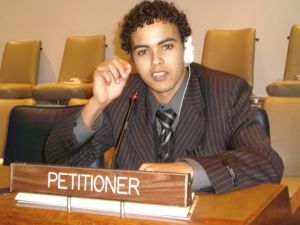 United Nations Hearing on the Western Sahara
United Nations Hearing on the Western SaharaSpecial Political and Decolonization IV Committee
October 6-7, 2009
By Salek Maoloud Lebaihi
Your Excellency Mr. Chairman. Honorable members of the Committee
Thank you for granting me this opportunity to represent the Saharawi people; it is an absolute honor to be here and advocate for a free Western Sahara. My name is Salek Maoloud Lebaihi; I am a Saharawi student at Methodist University, North Carolina.
As a Saharawi citizen ho was born and lived most of my life in a refugee camp; I witnessed and experienced the daily life of the Saharawi Refugees; a life which is full of suffering and pain; a life which is full of promises of peace that never came. The people of Western Sahara have been waiting for more than three decades for an opportunity to have a say in their future, living in one of the most uninhabitable places in the Sahara desert on southwestern Algeria, their survival depends on humanitarian aid which is decreasing year after year.
Mr. Chairman, Honorable members of the committee. How long do the people of Western Sahara have to wait to exercise their right of self-determination? How long do they have to wait for their voices to be heard? It is time to allow the Saharawi people to decide for their future in a free and fair referendum; they and they alone are the ones eligible to make such decision. Self-determination is not just a basic right, but one of the main principles that lead to the establishment of the United Nations; according to Article 1 of the Charter of the United Nation.
I urge this committee to act and use its influence to allow the Western Sahara people to participate in a free and fair referendum about their future and exercise their right of self-determination, no matter what the outcome is, the Saharawi people have the final say in whether it is an independent state or integration with Morocco. The Western Sahara problem is a decolonization issue in which important players like the United Nations and Spain have a moral responsibility, and they should ensure that the fate of Africas last colony will end by a referendum. Till then, many Saharawis dreams of seeing their beloved Western Sahara is still handing over broken promises; Free Western Sahara.
Once again, thank you very much for this opportunity and your attention.
Nyheter
Bli medlem. Få plakat
Slik kan du bli medlem, og få verdens fineste plakat i posten.
12. februar 2026
Ny rapport: Sertifiserte folkerettsbrudd
Internasjonale sertifiseringsstandarder dekker over Marokkos kontroversielle handel med fiskeri- og landbruksprodukter fra okkupert Vest-Sahara, dokumenterer ny rapport.
16. desember 2025
Nå: Skip ankommer Skretting på Averøy med last fra kontroversiell leverandør
Et fartøy med fiskemel ankommer i natt Averøy utenfor Kristiansund. Transporten åpner spørsmål om et hullete sertifiseringssystem.
15. desember 2025
Ny rapport: Marokko grønnvasker okkupasjonen av Vest-Sahara
En ny rapport beskriver de massive - og dypt problematiske - prosjektene for fornybar energi som Marokko utvikler i okkuperte Vest-Sahara.
11. desember 2025

